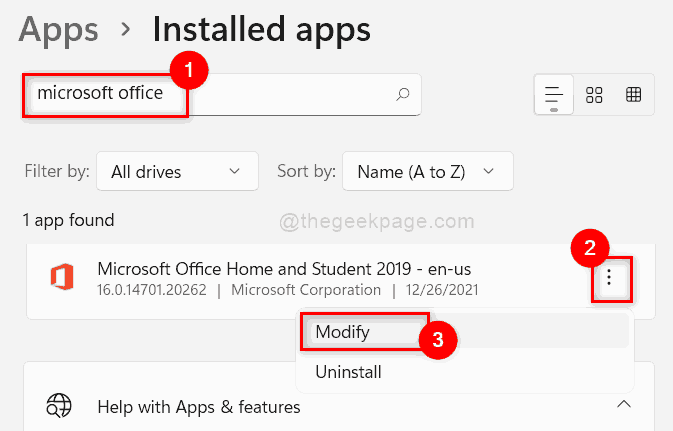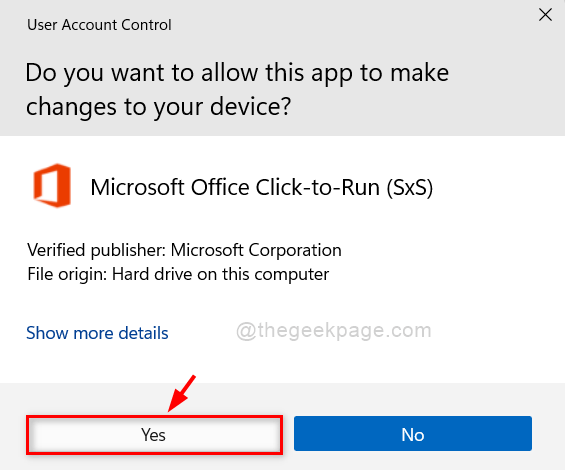DCOM stands for Distributed Component Object Model, which allows the users to remotely start a server object and use its implemented methods. Microsoft developed this DCOM over COM for the better use of implementations of interfaces. DCOM is basically platform and language independent and the users can reuse most of the components without the need of compilation again and again. Some of the windows users have reported that when they started using in-built applications / MS office, they get an error in the Event viewer saying “Unable to start a DCOM Server”. There might be several reasons behind it and we have analyzed the situation and came up with a few fixes that might be helpful in solving this error. If you are also facing this same error, please go through this post which explains all the solutions in an effective way.
Fix 1: Repair the Microsoft Office Suite on your system
Step 1: Press Windows + R keys together on your keyboard to open Run dialog box.
Step 2: Then, Type appwiz.cpl in the run box and hit the Enter keys to open the installed apps page.

Step 3: Type microsoft office in the search bar in the Installed apps page.
Step 4: Then, Click on three vertical dots (kebab icon) to see more options as shown below.
Step 5: Select Modify from the list.

Step 6: Click Yes on the UAC prompt to continue.

Step 7: Select Quick Repair radio button and then, Click Repair button to start repairing the MS Office as shown in the below screenshot.

Step 8: After it finishes the repair, Restart your system.
Check now if the problem got solved.
Fix 2: Uninstall Anti-Virus Software (Third-Party)
Step 1: Press Windows + R keys together on your keyboard to open Run dialog box.
Step 2: Then, Type appwiz.cpl in the run box and hit the Enter keys to open the installed apps page.

Step 3: Type your anti-virus name in the search bar of the Installed apps page.
NOTE: I have typed McAfee to show as an example. You can search for the anti-virus installed on your system.
Step 4: Then, click three vertical dots icon of the anti-virus application in the search results.
Step 5: Select Uninstall from the list as shown in the screenshot below.

Step 6: Then click Uninstall button in the small popup window below the antivirus application.

Step 7: Once done, Click Yes on the UAC prompt to continue.
Step 8: Please follow the onscreen instructions to uninstall the anti virus application on your system.
After the application is uninstalled successfully, try and check if the error still appears.
Hope this solved your issue. If not, try other solutions given below.
Fix 3: Delete the Firewall Interference using Registry Editor
Step 1: Press Windows + R keys together on your keyboard to open Run dialog box.
Step 2:Type regedit in the run box and press Enter key to open the Registry Editor on your system.
Step 3: Click Yes on the UAC prompt to continue.

Step 4: Copy and Paste the below given path in the clear and empty address bar of the Registry Editor.
HKEY_LOCAL_MACHINE\SYSTEM\CurrentControlSet\Services\SharedAccess\Parameters\FirewallPolicy\FirewallRules
Step 5: Then, Right click on the FirewallRules registry key on the left side of the Registry Editor.
Step 6: Click Delete from the context menu as shown below.

Step 7: Click Yes button to completely delete Registry key and all of its subkeys.

Step 8: Clear the address bar and copy & paste the given below path and press Enter key.
HKEY_LOCAL_MACHINE\SYSTEM\CurrentControlSet\Services\SharedAccess\Parameters\FirewallPolicy\RestrictedServices\Configurable\System
Step 9: Right click on the System registry key and select Delete option from the context menu as shown below.

Step 10: Accept the confirm delete keys window by clicking Yes button as shown.

Step 11: Then, go to below given path by copy pasting it in the address bar and hit the Enter key.
HKEY_LOCAL_MACHINE\SYSTEM\CurrentControlSet\Services\SharedAccess\Parameters\FirewallPolicy\RestrictedServices\AppIso\FirewallRules
Step 12: Delete the FirewallRules registry key by right clicking on it and selecting Delete button from the context menu as shown below.

Step 13: Then, Click Yes button as shown below.

Step 14: Close the Registry Editor and restart your system once.
Now Check if everything is working fine.
Hope this solved your problem.
Fix 4: Resolving the Permission Issue for QlikView Users only
NOTE: This fix is only for QlikView application users.
Step 1: Open the File Explorer by pressing Windows + E keys together on your keyboard.
Step 2: Navigate through C: drive > Program Files > QlikView application folder.
Step 3: Then, go to Distribution Service folder and double click qvb.exe file to open it.
Step 4: Now register the new Windows registry keys and GUIDs and restart your system to apply the changes.
Step 5: Once done, Press Windows + R keys together to open the Run dialog box.
Step 6: Type dcomcnfg.exe in the run dialog box and press the CTRL + SHIFT + ENTER keys to open the Component Services window.

Step 7: In the Component Services window, Click Component Services option to expand it on the left side menu.
Step 8: Then, Click Computers > My Computer option and select DCOM Config as shown in the below screenshot.
Step 9: On the right side of the window, search for QlikView application and right click on it.
Step 10: Then, Select Properties from the context menu.

Step 11: In the Properties window, Select Security tab and click Customize radio button under Launch and Activate Permissions section.
Step 12: Then, Click Edit button as shown below.

Step 13: In the Launch and Activation Permission window, Select the Group or user names from the list shown.
Step 14: Then, Make sure all the permissions for that group or username are allowed by checking all the checkboxes.
Step 15: Once done, Click OK button to close the window.

Step 16: After this, close all the windows and restart your system once to make changes.
Now check if the problem got solved.
Fix 5: Troubleshoot in Safe Boot Mode
Sometimes, troubleshooting the problem is the best way to deal with. Therefore, restarting your system in safe mode with networking will let the users find if any other drivers or software is causing this issue. Once you get to know the culprit behind this error, you can solve it by changing or updating or uninstalling the software or driver. So please, Restart your system in Safe Boot mode.
Hope the issue is resolved now.
That’s it guys.
I hope this article was informative and please let us know in the comments section below that which fix helped you in solving the error.
Thank you.